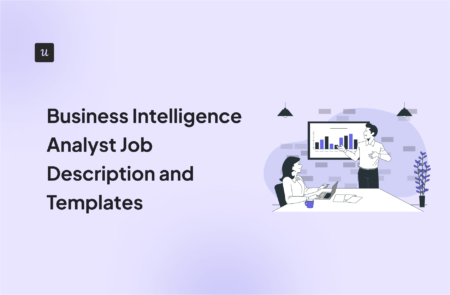
What is a business intelligence analyst?
A business intelligence (BI) analyst is a data specialist who helps businesses translate raw data into actionable insights. They act as a bridge between the world of numbers and the world of business decisions.
Business intelligence analyst’s main responsibilities
A business intelligence (BI) analyst’s core duties revolve around transforming data into knowledge that fuels better business choices. Here’s a quick rundown of their key tasks:
- Data Acquisition and Sorting: They help gather information from various sources like sales figures, customer surveys, and in-app behavior. This data often needs cleaning and organizing to ensure it’s accurate and usable.
- Data Analysis and Storytelling: Once the data is prepped, they leverage their analytical skills and tools to uncover trends, patterns, and hidden insights. They don’t just crunch numbers; they translate their findings into clear and compelling stories through reports, dashboards, and presentations.
- Strategic Decision Support: Ultimately, such data-driven insights can empower informed business decisions. They provide recommendations for product development, marketing strategies, resource allocation, or customer service improvements.
Business intelligence analyst job description and template
Here’s a sample business intelligence analyst job description template that reflects real-world postings so you can better prepare yourself:
Job Title: Business Intelligence Analyst
Department: Data & Analytics/IT/Business Operations
Reports To: Director of Analytics/Head of Business Intelligence
Summary:
We are seeking a highly motivated and analytical Business Intelligence (BI) Analyst to join our team. In this role, you will leverage your data expertise to uncover valuable insights, drive data-informed decision-making, and contribute to the overall growth of the company.
Responsibilities:
- Collect, process, and analyze large datasets from various sources.
- Develop and maintain complex data models, reports, and dashboards using BI tools (e.g., Power BI, Tableau).
- Identify trends, patterns, and correlations in data to uncover actionable insights.
- Create compelling visualizations that effectively communicate findings to stakeholders.
- Partner with cross-functional teams to understand business needs and translate them into data requirements.
- Collaborate with stakeholders to define key performance indicators (KPIs) and metrics.
- Present findings and recommendations to both technical and non-technical audiences.
Qualifications:
- Education: Bachelor’s degree in Computer Science, Statistics, Mathematics, or a related field.
- Experience: 2+ years of experience in a BI Analyst or similar role.
- Skills:
- Strong proficiency in SQL for data extraction and manipulation.
- Experience with data visualization tools (e.g., Power BI, Tableau).
- Familiarity with ETL processes and data warehousing concepts.
- Knowledge of programming languages (e.g., Python, R) is a plus.
- Strong communication and presentation skills.
- Ability to collaborate effectively with cross-functional teams.
Additional Information:
- Industry: This job description applies to a wide range of industries, including technology, finance, healthcare, retail, and more.
- Seniority Level: This template is tailored for a mid-level BI Analyst position. For entry-level or senior positions, adjust the experience requirements and responsibilities accordingly.
Best practices to be a great business intelligence analyst
Becoming a great Business Intelligence (BI) Analyst involves more than just mastering technical skills. It also requires communication and a proactive approach to problem-solving. Here are some best practices to excel in this role:
- Understand the business: A great BI analyst isn’t just a data cruncher; they’re a strategic partner. For instance, if you’re working for an e-commerce company, understand metrics like customer acquisition cost, average order value, and churn rate. This knowledge will help you frame your analysis and deliver insights that directly impact the bottom line.
- Master your tools: Technical proficiency is a must. Become an expert in SQL to efficiently query and manipulate data. Learn to create compelling visualizations using tools like Tableau or Power BI, and leverage advanced features like calculated fields and custom visualizations.
- Data quality is key: “Garbage in, garbage out.” Ensure the accuracy and reliability of your data by establishing robust data cleaning and validation processes. Address missing values, outliers, and inconsistencies before proceeding with analysis. Collaborate with data engineers to implement data governance practices that ensure data integrity, security, and compliance. Remember, your insights are only as good as the data they’re based on.
- Focus on actionable insights: Don’t just present data; tell a story that resonates with stakeholders. Highlight the key findings, their implications for the business, and actionable recommendations. For example, instead of saying “Churn rate increased by 5%,” say “We’ve identified a 5% increase in churn, primarily among customers acquired through social media channels. We recommend focusing on improving onboarding for these customers to increase their lifetime value.”
- Foster collaboration and communication: Building strong relationships with stakeholders is crucial. You should regularly communicate with business users to understand their needs, gather feedback on your reports, and ensure your analyses are relevant and useful.
Conclusion
We hope this guide has provided you with valuable insights into the roles and responsibilities of business intelligence analysts.
By understanding the key responsibilities and skills required, you can make informed decisions and take meaningful steps in your career or recruitment journey.
Looking into tools for business intelligence analysts? Userpilot is an all-in-one product platform with engagement features and powerful analytics capabilities. Book a demo to see it in action!
FAQ
What does a business intelligence analyst do?
Business intelligence (BI) analysts are the data detectives of an organization. They collect, analyze, and interpret complex data sets to uncover meaningful insights that drive informed decision-making.
Does a business intelligence analyst need coding?
While not all BI analyst roles require extensive coding, having some programming skills can be a significant advantage. Basic knowledge of SQL (Structured Query Language) is often necessary for querying databases and manipulating data. Additionally, familiarity with languages like Python or R can be beneficial for more advanced analysis and automation tasks.
What is the role of a BA in business intelligence?
Business analysts (BAs) play a crucial role in bridging the gap between IT and business within the BI process. They work closely with stakeholders to understand their business problems and translate them into actionable data requirements. BAs also collaborate with BI analysts to ensure that the data analysis and visualization align with business objectives and provide meaningful insights for decision-making.
What is an AI business intelligence analyst?
An AI business intelligence analyst leverages artificial intelligence and machine learning techniques to enhance BI processes. They build and deploy AI models to automate data analysis, identify hidden patterns, and generate predictive insights. AI BI analysts also work on integrating AI capabilities into BI tools and platforms.






